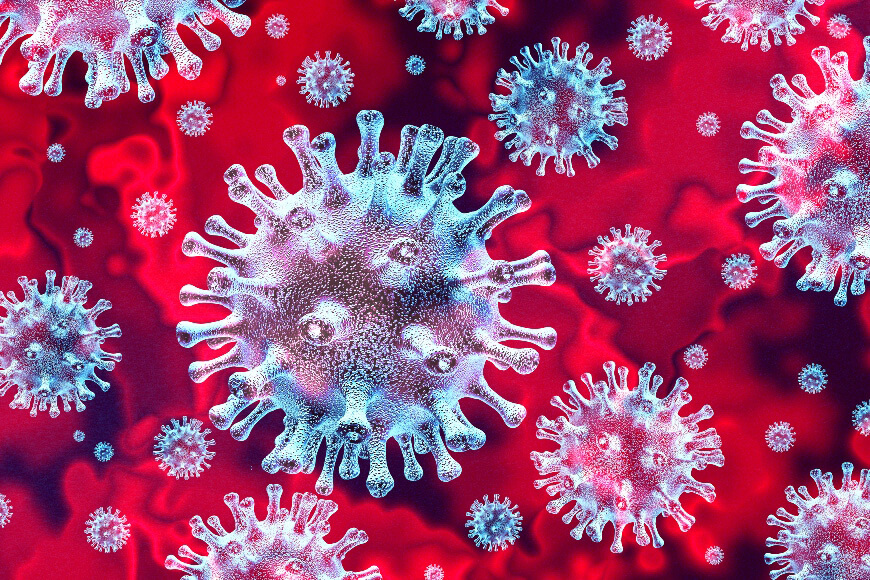FAQs on the Coronavirus
View these FAQs from the Centers for Disease Control and Prevention

Q: What is a novel coronavirus?
A: A novel coronavirus is a new coronavirus that has not been previously identified. The virus causing coronavirus disease 2019 (COVID-19) is not the same as the coronaviruses that commonly circulate among humans and cause mild illness, like the common cold.
A diagnosis with coronavirus 229E, NL63, OC43, or HKU1 is not the same as a COVID-19 diagnosis. Patients with COVID-19 will be evaluated and cared for differently than patients with common coronavirus diagnosis.
Q: What are the symptoms and complications that COVID-19 can cause?
A: Current symptoms reported for patients with COVID-19 have included mild to severe respiratory illness with fever, cough, and difficulty breathing.
Q: What is the source of the virus?
A: Public health officials and partners are working hard to identify the original animal source of the virus that causes COVID-19. Coronaviruses are a large family of viruses, some causing illness in people and others that circulate among animals, including camels, cats and bats. Analysis of the genetic tree of this virus indicates it originated in bats, but whether the virus jumped directly from bats or whether there was an intermediary animal host is not, yet, known. SARS-CoV, another bat-origin coronavirus jumped to infect people via civets, while MERS-CoV, another bat-origin coronavirus jumped to people via camels.
Q: How does the virus spread?
A: The new coronavirus seems to be spreading from person-to-person. The CDC believes at this time that symptoms of COVID-19 may appear in as few as two days or as long as 14 days after exposure.
Q: Can someone who has had COVID-19 spread the illness to others?
A: The virus that causes COVID-19 is spreading from person-to-person. Someone who is actively sick with COVID-19 can spread the illness to others. That is why CDC recommends that these patients be isolated either in the hospital or at home (depending on how sick they are) until they are better and no longer pose a risk of infecting others.
How long someone is actively sick can vary, so the decision on when to release someone from isolation is made on a case-by-case basis in consultation with doctors, infection prevention and control experts, and public health officials and involves considering specifics of each situation including disease severity, illness signs and symptoms, and results of laboratory testing for that patient.
Current CDC guidance for when it is OK to release someone from isolation is made on a case-by-case basis and includes meeting all of the following requirements:
- The patient is free from fever without the use of fever-reducing medications.
- The patient is no longer showing symptoms, including cough.
- The patient has tested negative on at least two consecutive respiratory specimens collected at least 24 hours apart.
- Someone who has been released from isolation is not considered to pose a risk of infection to others.
Q: Can someone who has been quarantined for COVID-19 spread the illness to others?
A: Quarantine means separating a person or group of people who have been exposed to a contagious disease but have not developed illness (symptoms) from others who have not been exposed, in order to prevent the possible spread of that disease. Quarantine is usually established for the incubation period of the communicable disease, which is the span of time during which people have developed illness after exposure. For COVID-19, the period of quarantine is 14 days from the last date of exposure because 14 days is the longest incubation period seen for similar coronaviruses. Someone who has been released from COVID-19 quarantine is not considered a risk for spreading the virus to others because they have not developed illness during the incubation period.
Q: Should I be tested for COVID-19?
A: If you develop a fever and symptoms of respiratory illness, such as cough or shortness of breath, within 14 days after travel from China, you should call ahead to a health care professional and mention your recent travel or close contact. If you have had close contact with someone showing these symptoms who has recently traveled from this area, you should call ahead to a health care professional and mention your close contact and their recent travel. Your health care professional will work with your state’s public health department and CDC to determine if you need to be tested for COVID-19.
Q: How do you test a person for COVID-19?
A: At this time, diagnostic testing for COVID-19 can be conducted only at CDC.
State and local health departments who have identified a person under investigation (PUI) should immediately notify CDC’s Emergency Operations Center (EOC) to report the PUI and determine whether testing for COVID-19 at CDC is indicated. The EOC will assist local/state health departments to collect, store, and ship specimens appropriately to CDC, including during after-hours or on weekends/holidays.
Q: Am I at risk for COVID-19 in the United States?
A: This is a rapidly evolving situation and the risk assessment may change daily. The latest updates are available on CDC’s Coronavirus Disease 2019 (COVID-19) website.
Q: Has anyone in the United States gotten infected?
A: Yes. The first COVID-19 case in the United States was reported on January 21, 2020. The first confirmed instance of person-person-spread with this virus in the U.S. was reported on Jan. 30, 2020. See the current U.S. case count of COVID-19.
Q: Will warm weather stop the outbreak of COVID-19?
A: It is not yet known whether weather and temperature impact the spread of COVID-19. Some other viruses, like the common cold and flu, spread more during cold weather months, but that does not mean it is impossible to become sick with these viruses during other months. At this time, it is not known whether the spread of COVID-19 will decrease when the weather becomes warmer. There is much more to learn about the transmissibility, severity and other features associated with COVID-19 and investigations are ongoing.
Prevention and Treatment
There is currently no vaccine to prevent coronavirus disease 2019 (COVID-19). The best way to prevent illness is to avoid being exposed to this virus. However, as a reminder, CDC always recommends everyday preventive actions to help prevent the spread of respiratory diseases, including:
- Avoid close contact with people who are sick.
- Avoid touching your eyes, nose, and mouth.
- Stay home when you are sick.
- Cover your cough or sneeze with a tissue, then throw the tissue in the trash.
- Clean and disinfect frequently touched objects and surfaces using a regular household cleaning spray or wipe.
Follow CDC’s recommendations for using a face mask.
- CDC does not recommend that people who are well wear a face mask to protect themselves from respiratory diseases, including COVID-19.
- Face masks should be used by people who show symptoms of COVID-19 to help prevent the spread of the disease to others. The use of face masks is also crucial for health workers and people who are taking care of someone in close settings (at home or in a health care facility).
- Wash your hands often with soap and water for at least 20 seconds, especially after going to the bathroom; before eating; and after blowing your nose, coughing, or sneezing.
- If soap and water are not readily available, use an alcohol-based hand sanitizer with at least 60% alcohol. Always wash hands with soap and water if the hands are visibly dirty.





